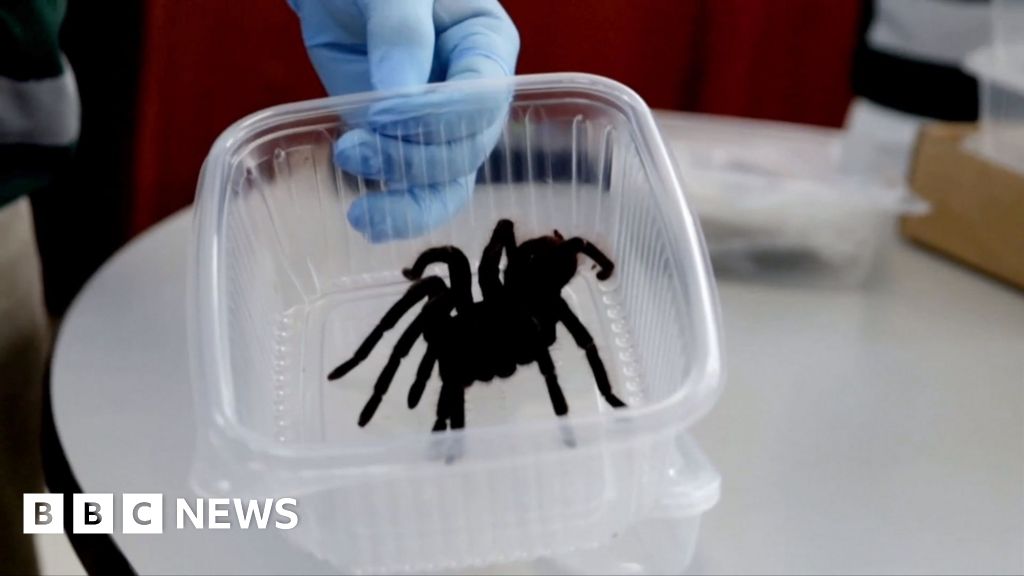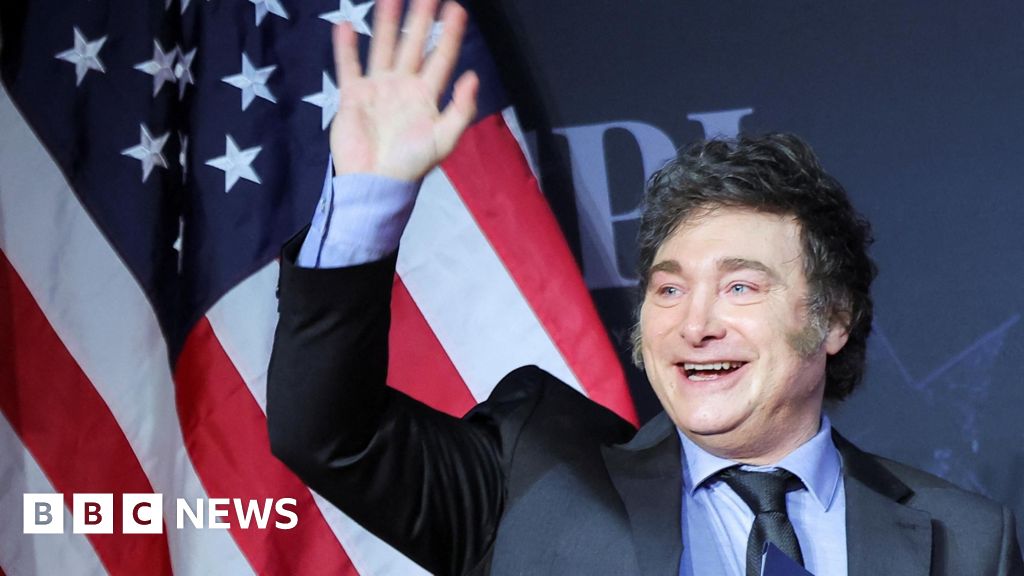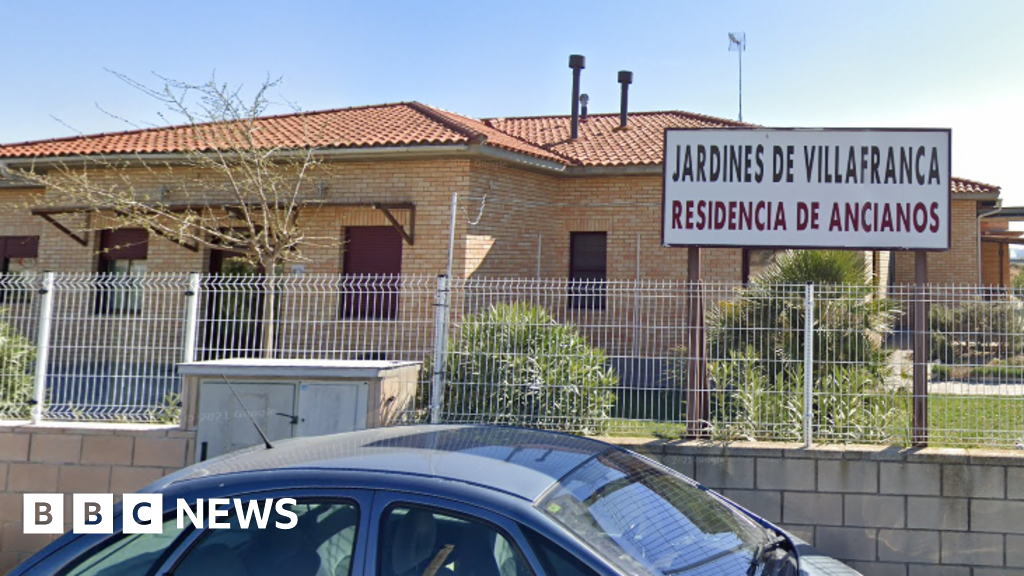ARTICLE AD BOX
By Mark Savage
BBC Music Correspondent
image source, Reuters
image captionR Kelly has been awaiting trial since his arrest in 2019The jury has retired in R. Kelly's sex trafficking trial in New York, after a month of testimony regarding the star's alleged sexual abuse of men, women and underage girls.
The 54-year-old is facing one charge of racketeering - which positions him as the head of a criminal enterprise that preyed on young women - and eight counts of trafficking girls and women across state lines for prostitution.
Once one of the world's biggest pop stars, Mr Kelly was initially arrested on these charges in July 2019, but his trial was delayed because of the Covid-19 pandemic and scheduling issues with separate cases he faces in other states.
In their closing arguments, prosecutors painted Mr Kelly as a predator who destroyed the lives of people around him.
"He used lies, manipulation, threats and physical abuse to dominate his victims," said assistant US attorney Elizabeth Geddes, adding that his immense wealth and fame allowed him to "hide in plain sight".
Mr Kelly's lawyers sought to attack the credibility of the witnesses who accused him of sexual and physical abuse, saying their stories were manufactured or exaggerated, and casting them as opportunists cashing in on his fame.
"They're monetising. They know what the game is. They're surviving off of R. Kelly," Deveraux Cannick told the jury.
Mr Kelly, whose full name is Robert Sylvester Kelly, has pleaded not guilty on all counts but refused the opportunity to testify in his defence.
If convicted, he faces between 10 years in prison and a life sentence.
Here are the key moments from the trial, many of which readers may find upsetting.
Prosecutors painted a pattern of predatory sexual abuse
image source, Reuters
image captionR. Kelly pictured arriving for a child support hearing in Chicago in 2019Mr Kelly is not charged with rape or assault, but prosecutors have been allowed to present evidence of potential crimes related to the racketeering charge, regardless of when they occurred.
As such, they have called more than half a dozen witnesses who said they were abused by Mr Kelly while they were underage.
Both male and female, they described being approached by the star or one of his associates after a concert, in a shopping mall, or in a McDonald's, and being slipped a phone number. Often, Mr Kelly would offer to mentor their music career, they alleged, in return for sexual favours.
Several witnesses claimed Kelly kept them in a constant state of fear, demanding they follow his stringent rules,and ordering them to call him "Daddy". Those who disobeyed were punished, sometimes with degrading sexual acts, they claimed. Two women accused the star of rape.
Mr Kelly's defence portrayed the women as "groupies" and jilted lovers, who were seeking revenge after falling out of favour with the star.
"You heard about a man who treated these women like gold," Mr Cannick told the jury.
One witness said she was choked until she lost consciousness
image source, Reuters
image captionJerhonda Pace, who previously spoke on the Surviving R. Kelly documentary, was the first witnessJerhonda Pace testified over the first two days of the trial, giving an account of her time with the singer.
She said Mr. Kelly controlled what she wore, when she could eat, and whether she could use the bathroom.
On one occasion, she recalled breaking "Rob's rules", after which the star "slapped me and choked me until I passed out," she alleged.
Ms Pace, now 28, was one of several women who spoke to the Surviving R. Kelly documentary in 2019.
In her testimony, she said she started having sex with the singer when she was 16. She initially told him she was older, but when she revealed the truth, he continued the relationship, instructing her to call him "Daddy".
"He wanted me to put my hair up in pigtails and dress like a girl scout," she told the court.
Mr Kelly's lawyers tried to portray Ms Pace as a "superfan" who reacted badly when the star lost interest in her. In cross-examination, Deveraux Cannick accused her of fabricating her story for money and fame; and of "stalking" his client. She denied the claims.
Another woman said she was pressured into having an abortion
The prosecution's second witness said she began a five-year relationship with Mr Kelly when she was 17 years old. Like Ms Pace, she alleged that the singer sought to control every detail of her life, demanded that she called him "Daddy", and would punish her if she did not comply.
The physical abuse took place "nearly every two to three days," she alleged.
Identified only as Jane Doe 5, the 23-year-old also told the court that Mr Kelly urged her to get an abortion she didn't want, after she became pregnant in 2017.
"He said, 'You need to look into that abortion stuff because you need to keep that body,'" she said.
An assistant said he helped R. Kelly marry Aaliyah when she was underage
image source, Getty Images
image captionR. Kelly wrote and produced Aaliyah's debut album, titled Age Ain't Nothing But A NumberMr Kelly's former tour manager testified that he bribed a government worker to obtain a fake ID for R&B star Aaliyah - who was then aged 15 - so the singers could marry.
Demetrius Smith, 65, said he was informed Aaliyah might be pregnant after a concert on Mr Kelly's 1994 tour, and that they planned to get married so Mr Kelly could avoid potential prosecution for having sex with a minor.
Although Mr Smith initially objected to the plan, he says he eventually told Mr Kelly, "'I know how to get her an ID,' and that's what I did."
One of the star's former backing dancers later testified that she had accidentally disturbed Mr Kelly and Aaliyah in a sexual situation in 1993, a year before the marriage.
The woman, who testified under the name Angela, said Aaliyah would have been 13 or 14 at the time, making her the youngest of his alleged victims.
The minister who officiated the wedding, Nathan Edmond, also testified, saying he was unaware of who the couple were at the time.
Mr Edmond, now 73, said he was asked to sign a non-disclosure agreement after the ceremony but refused. Instead, he promised Mr Kelly he would never speak about the wedding. He only testified at the trial under subpoena.
The marriage was annulled a year after it took place. Aaliyah died in a plane crash in 2001.
Mr Kelly's lawyers described much of the testimony regarding Aaliyah as "fluff". The marriage and Aaliyah's alleged pregnancy are not relevant to the charges he is facing, argued Mr Cannick.
The only pertinent question was whether Mr Kelly tried to bribe an Illinois employee for a fake identification.
"Robert knew nothing about it," he said.
Partners claimed they were 'knowingly infected' with herpes
image source, Reuters
image captionR. Kelly was once the biggest R&B star in the world, with hits like Bump and Grind and I Believe I Can FlySeveral women claimed they had contracted herpes after sexual intercourse with Mr Kelly, who failed to disclose he carried the virus.
One witness, known only as Jane Doe, said the condition became so bad it got to "the point where I couldn't walk".
She alleged the star "purposely gave me something he knew he had".
Another witness, Kate, said she had reached a $200,000 (£145,000) settlement with Mr Kelly after contracting the disease in 2001.
Mr Kelly's longtime physician, Kris McGrath, testified that he first suspected the singer had herpes in 2000.
Although tests came back negative, Dr McGrath noted the possibility of a false negative and said he told the star to "inform your sexual partners so they can make a decision whether or not to have sex with you".
The physician also testified that, between 2007 and 2019, Mr Kelly was treated for genital herpes at least five times. In that time, he said he had prescribed herpes medication "so often that I memorised the phone number" of the star's local pharmacy.
The star's defence challenged Dr McGrath's diagnosis, and argued that, as herpes is not life-threatening, any related charges should not be considered.
Two women accused R. Kelly of rape
A woman identified as Abbie claimed that Mr Kelly pinned her down and raped her in his dressing room after a concert in 1994 - just two days after his wedding.
At the time she was 17, and had been invited backstage to meet the star with a friend. She claimed he had cleared the room before assaulting her, telling the court: "I just went blank."
Now 44, Addie said she had waited until now to report the assault "because I didn't want more victim-shaming and more trauma at that time".
The court heard a second allegation of rape in the fourth week of a trial, by a reporter who said she was invited to Mr Kelly's house for an interview in 2003.
Instead, she claimed she was locked in a room for several days and lost consciousness after being drugged. When she woke up, she saw the star pulling up his trousers in the corner of the room.
"It felt like something had been inside of me," she told the jury, saying later: "I was sexually assaulted."
The defence accused her of fabricating the account, noting that Mr Kelly had paid for her trip to Chicago.
"The kidnapper paid her way to get there? The kidnapper paid her way to come?" Mr Cannick asked the jury. "I mean, come on."
He added that there was no physical evidence or police report to corroborate either rape accusation.
Multiple witnesses said they were video-taped in humiliating sexual situations
A woman named Anna testified that the star would spank her if she broke his rules, and claimed that he often videotaped the punishment on an iPad.
On another occasion, he forced her to parade naked in front of a camera, calling herself "stupid" and a "slut", she alleged.
Anna also testified that Mr Kelly made her be "sexual and seductive with bodily fluids", echoing claims by Jane Doe 5, who said the singer once forced her to smear faeces on her face and "put it in my mouth and act like I liked, enjoyed that".
Again, he is alleged to have taped this scene, and threatened to make her film another take because she didn't seem "into it enough."
A male witness also described how the star coerced him into sexual encounters with women, which he would then film.
During the encounters, the women, whose names he did not know, appeared "zombie-ish," he said.
In closing arguments, Mr Kelly's team portrayed the star's conduct as the consequence of a "playboy lifestyle".
"It's not a crime to like kinky sex," argued Mr Cannick, adding that "some people just like" relationships between an older man and a "younger female."
He also dismissed the repeated claim that Mr Kelly ordered his girlfriends to call him "Daddy" as irrelevant, suggesting it was an affectionate term.
"Daddy! It's almost a crime to call a man a Daddy. I guess people can't do that anymore," Mr Cannick said. "Ho is good, daddy is bad.... The former Vice President [Mike Pence] called his wife Mother."
Assistants said working for R. Kelly was like "entering the Twilight Zone"
image source, Reuters
image captionMr Kelly's former assistant Diana Copeland said she was forced to write a false confession of theftR. Kelly's former assistant Anthony Navarro testified that working for the singer was "almost like the Twilight Zone".
"You went into the gate, and it was like a different world, just a strange place," he told the court.
Mr Navarro worked for the star between 2007 and 2009, and said he was issued with a list of "Rob's Rules" - the same phrase used by Ms Pace in her testimony. Among the most prominent: "I wasn't supposed to be talking to any of the girls - the guests - who were coming into the house," he recalled.
Mr Navarro also claimed to have driven one of Mr Kelly's girlfriends across state lines, from Alabama to Atlanta - a key piece of evidence for the prosecution's trafficking case.
The defence dismissed the charge as absurd.
"They are in relationships," Mr Cannick told the jury. "This is just like you taking your girlfriend, your wife, your husband on business."
Another assistant, Diana Copeland, confirmed that women were confined to their rooms inside Mr Kelly's various homes, offices, and studios.
She described a state of paranoia within his compound, saying she was once asked to change into a robe to demonstrate she was not wearing a wire.
"He could get pretty heated," said Copeland, who was Kelly's assistant for 15 years. She told jurors he made her cry at times.
However, she said she did not witness any sexual or physical abuse during her time with the star.
Victims were forced to write letters defending the star
Five months after Mr Kelly was arrested, investigators opened a safe and discovered a stash of the star's personal papers. Among them were several letters written by the women he is now accused of abusing, that appeared to absolve him of guilt.
One handwritten note began, "At the age of 17 I never had sex with Robert Kelly," before listing a series of specific sexual acts that the author said she had not participated in with the singer.
Another woman, who testified as Jane, wrote that she spanked herself "really hard" until she had bruises in an effort to blackmail Mr Kelly.
On the witness stand, several of Mr Kelly's accusers said they had been coerced into writing these messages.
"He wanted us to include letters saying that we had stolen money from him, that we had stolen watches from him, that we had been molested by family members, that we had been abused and neglected by family members and so forth," testified one anonymous witness.
Psychologist Dawn M Hughes told jurors that letters like these gave Mr Kelly leverage if his alleged victims attempted to leave or testify against him.
She added that such power dynamics were common in cults, and had the effect of "slowly sucking the oxygen out of the room and once you realise it, you can't get out."
Mr Kelly's lawyers dismissed the allegations, saying Kelly and his girlfriends functioned like a "family".
Defence witnesses denied knowledge of Mr Kelly's alleged crimes
Mr Kelly's defence was swift by comparison to the prosecution's forensic, weeks-long case.
They called just half-a-dozen witnesses, mainly former employees of the star, who said they did not recognise the behaviour described by his accusers.
Among them was Larry Hood, a former Chicago police officer who worked as Mr Kelly's security guard for a number of years.
Mr Hood testified that he never saw the star with underage girls and never witnessed him hit a woman or lock a woman in a room.
"As a police officer, I would have had to take action against that," he told the court.
A former accountant for Mr Kelly also testified, saying that girls in the singer's entourage dressed "appropriately", and that he did not recall Kelly angrily raising his voice in their presence.
Dhanai Ramnanan, an aspiring singer who has worked with Mr Kelly since 2005, added that women in the star's entourage were never prevented from eating or using the bathroom.
"Whenever we'd go to a restaurant, they'd sit down first, they'd order first, they got to eat first," he said of the star's girlfriends. "I mean, chivalry, basically."
Prosecutors tried to show that the witnesses were not as close to Mr Kelly as they claimed, and would not have been present during any alleged abuse.
Under cross-examination, several of the witnesses admitted their careers were tied to Mr Kelly, and that they had a vested interest in seeing him acquitted.
What happens next?
The jury has now retired to consider their verdict.
Regardless of the outcome, the singer is facing a separate trial in Chicago on child pornography and obstruction charges, in addition to sex abuse charges in Illinois and Minnesota.
Follow us on Facebook, or on Twitter @BBCNewsEnts. If you have a story suggestion email entertainment.news@bbc.co.uk.

 3 years ago
39
3 years ago
39








 English (US)
English (US)